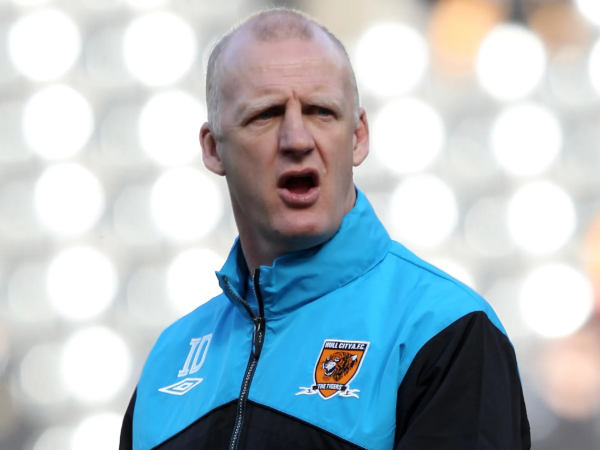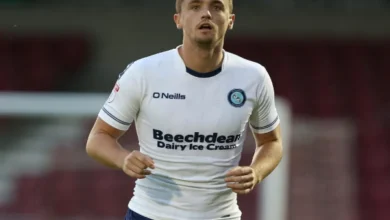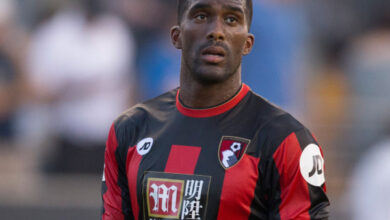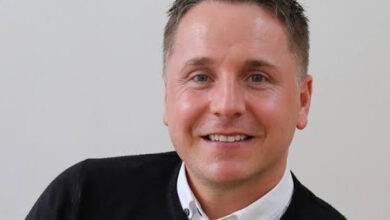Iain Dowie: From Premier League Striker to Manager, Pundit, and Inspirational Figure
A Complete Biography of the Former Northern Ireland International and Football Personality

Iain Dowie is a name that resonates deeply within English and Northern Irish football circles. Known for his unyielding determination both on and off the pitch, Dowie’s journey from a mechanical engineer to a professional footballer and then a Premier League manager is nothing short of inspirational. His football career, managerial stints, media presence, and educational background make him a multifaceted figure in British sport. This article explores every detail of Iain Dowie’s life — his age, family, net worth, achievements, and enduring legacy — providing an in-depth view of a man who truly embodies “bouncebackability.”
Iain Dowie Age and Early Life
Born on January 9, 1965, in Hatfield, Hertfordshire, England, Iain Dowie age as of 2025 is 60 years old. Despite being born in England, he qualified to represent Northern Ireland through his father’s heritage. His upbringing was defined by hard work, education, and a deep love for football.
Before turning professional, Dowie was academically gifted. He earned a Master’s degree in Mechanical Engineering from the University of Hertfordshire, and even worked as an aerospace engineer at British Aerospace. Balancing science and sport, he pursued non-league football during evenings and weekends before being noticed by league scouts. This blend of intelligence, grit, and passion set the foundation for his future success in football management and broadcasting.
Iain Dowie Family and Personal Background
Iain Dowie’s family has always been at the center of his story. He comes from a supportive background where education and discipline were core values. His father, of Northern Irish descent, played a crucial role in helping him qualify for the Northern Ireland national team. Dowie is married and has children, and throughout his public career, he has often spoken about the importance of family stability and loyalty.
While he tends to keep his private life away from media scrutiny, those close to him describe him as deeply family-oriented. His resilience through various career challenges, including his recent health scare, reflects the strength of his personal support system.
The Early Football Journey
Iain Dowie’s football career began in non-league clubs such as Cheshunt, St Albans City, and Hendon, while he was still working as an engineer. His late start in professional football — signing with Luton Town in 1988 at the age of 23 — was unusual, but his drive and physical presence made an immediate impact.
A powerful striker, Dowie quickly made a name for himself with his aerial ability and work ethic. His performances for Luton caught the eye of top-flight clubs, and soon he moved into the Premier League, where he would make his mark as a player known for determination and leadership rather than glamour.
Iain Dowie’s Club Career
Over the years, Iain Dowie represented several well-known clubs:
Luton Town – His first professional team, where he proved that hard work and persistence could overcome a late start.
West Ham United – His spell here in the early 1990s saw him gain Premier League exposure and respect from fans for his relentless playing style.
Southampton – Another key chapter in his playing days, where he contributed valuable goals and experience.
Crystal Palace – Perhaps the club most closely associated with Dowie, both as player and later as manager.
Queens Park Rangers (QPR) – He ended his playing career with QPR, where he also began developing his coaching ambitions.
Throughout his playing career, Dowie scored 128 goals in nearly 500 appearances, a remarkable achievement considering his unconventional route into professional football.
International Career with Northern Ireland
Though English by birth, Dowie proudly represented Northern Ireland between 1990 and 1999, earning 59 caps and scoring 12 goals. His performances in green were marked by passion and professionalism. He often played against the strongest European teams of the time and was respected for his leadership on the field.
Representing Northern Ireland gave him immense pride, and he frequently spoke about how much it meant to wear the shirt of his father’s homeland.
Transition from Player to Manager
After hanging up his boots, Iain Dowie smoothly transitioned into coaching. His tactical mind and motivational skills quickly made him a popular choice for managerial roles. His coaching career began at Queens Park Rangers, where he worked with the youth and reserve teams. That experience paved the way for his first senior managerial job at Oldham Athletic in 2002.
At Oldham, Dowie demonstrated his ability to inspire teams with limited budgets. He led the club to the League One play-offs despite financial constraints. His success there earned him recognition, leading to one of the most memorable chapters of his career.
The Crystal Palace Miracle
In December 2003, Iain Dowie took over as manager of Crystal Palace, a club languishing near the bottom of the Championship. In a stunning turnaround, he led the team from near relegation to promotion through the 2003-04 Championship Play-Offs.
That achievement became a cornerstone of his reputation. Palace fans still celebrate that season as one of the club’s greatest comebacks — a testament to Dowie’s motivational style. It was during this time that he famously coined the term “bouncebackability,” referring to his team’s capacity to recover from setbacks. The term gained such popularity that it was officially added to the Oxford English Dictionary in 2005.
Further Managerial Roles
After Crystal Palace, Dowie went on to manage several clubs:
Charlton Athletic (2006): His tenure was brief but challenging, as the club faced transitions and tough competition in the Premier League.
Coventry City (2007–2008): Dowie brought energy and structure to Coventry, focusing on rebuilding team morale.
Queens Park Rangers (2008): His second stint at QPR allowed him to work with a mix of young talent and experienced players.
Newcastle United (2009): He served as an assistant to Alan Shearer during the club’s Premier League survival fight.
Hull City (2010): Dowie took charge during a difficult period and worked to stabilize the team.
While his managerial career had its ups and downs, his reputation for discipline, work ethic, and tactical understanding remained consistent.
Media and Broadcasting Career
After leaving full-time management, Iain Dowie became a familiar face on television. He worked as a sports pundit and co-commentator for networks such as Sky Sports, ITV, and other media outlets. His analytical approach and clear communication style earned him respect as a football analyst.
Dowie’s engineering background adds depth to his analysis; he often breaks down football tactics with precision and logic. Over time, he’s become one of the most articulate and well-informed voices in football broadcasting.
Iain Dowie Net Worth and Career Earnings
Estimating Iain Dowie’s net worth in 2025, reports suggest it falls between $3 million and $5 million. His income stems from his long football career, managerial contracts, punditry work, and business ventures.
During his managerial years, he earned lucrative deals at clubs such as Charlton and Crystal Palace. His continued involvement in broadcasting and occasional speaking engagements contributes to his financial stability. Dowie also works with Belmont Sport & Entertainment, a talent management and consultancy firm that handles media and corporate partnerships.
Iain Dowie Wikipedia and Recognition
The Iain Dowie Wikipedia page provides a concise but accurate overview of his life and career, documenting his playing statistics, management record, and contributions to football culture. His name is permanently linked to the English football lexicon through the term “bouncebackability.”
Beyond Wikipedia, sports archives and fan forums frequently cite him as an example of a player and manager who rose through sheer determination rather than natural flair. His story continues to inspire players who take unconventional routes into professional football.
The Health Scare That Shocked Fans
In early 2024, Iain Dowie suffered a cardiac arrest during a spin class. Quick action from bystanders and medical professionals saved his life. He later revealed that he now lives with an implantable defibrillator device and is grateful for his recovery.
In interviews following the incident, Dowie reflected on how it changed his perspective on life, family, and health. His resilience through this experience has made him an even more admired figure in the football community.
Iain Dowie’s Legacy in Football
What sets Iain Dowie apart isn’t just his playing or coaching record — it’s his attitude. His story epitomizes perseverance, adaptability, and self-belief. From an engineer designing aircraft components to leading teams in the Premier League, Dowie’s journey demonstrates that passion and intelligence can coexist successfully in professional sport.
He is remembered as:
A hard-working forward who gave everything for his teams.
A motivator who transformed struggling clubs.
A manager who made “bouncebackability” a philosophy for life.
A commentator who combines football experience with technical clarity.
Life Beyond Football
Outside the public eye, Dowie has shown interest in business and community work. In recent years, he joined a law and conveyancing company as a business director, bringing leadership and analytical skills to the corporate world. His professional transformation from athlete to executive reflects his versatile capabilities.
He also participates in charity events, particularly those related to heart health awareness and sports development programs for young players. His openness about his own health scare has encouraged many fans to take fitness and medical check-ups seriously.
Interesting Facts About Iain Dowie
Engineering Genius: Before football fame, he helped design missiles at British Aerospace.
Late Bloomer: Turned professional at 23 — an age when most players are already established.
“Bouncebackability”: The phrase became so popular it entered the Oxford English Dictionary in 2005.
Dual Heritage: Born in England but proudly represented Northern Ireland.
Academic Athlete: Holds a Master’s degree — rare among professional footballers.
TV Presence: Regular pundit and co-commentator for major sports networks.
Resilient Survivor: Survived a cardiac arrest in 2024 and continues to advocate for health and positivity.
Conclusion
Iain Dowie stands as a symbol of hard work, adaptability, and resilience. His evolution from an engineer to a footballer, then to a Premier League manager and respected pundit, showcases a career built on intellect and determination. At 60, he continues to inspire fans, players, and aspiring managers with his story of persistence and positivity.
Whether through his coaching success, his memorable words like “bouncebackability,” or his recovery from life’s challenges, Iain Dowie’s journey remains one of football’s most compelling narratives. His legacy reminds us that success is not about where you start — it’s about how fiercely you keep moving forward.



